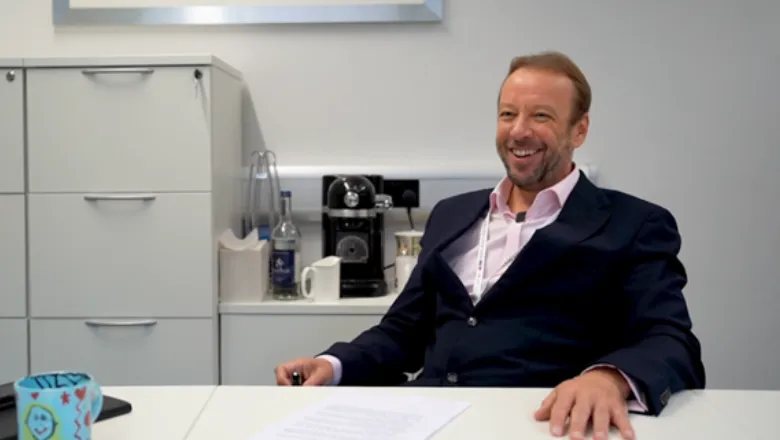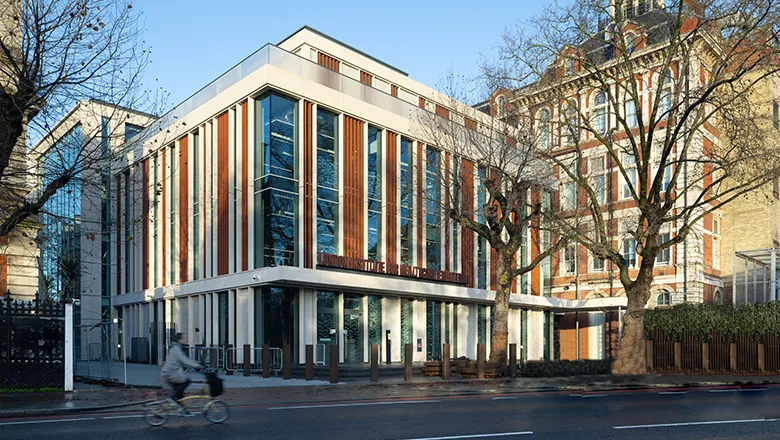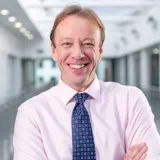27 November 2024
Talking Leadership: Professor Graham Lord, Senior Vice-President (Health & Life Sciences)
We catch-up with Graham Lord on his first few months at King's, his ambitions for King's Health Partners, and being Senior Sponsor for Disability Inclusion.

Can you start by telling us a bit more about your role as Senior Vice President Health and Life Sciences?
My primary focus is to ensure that all our activities in Health and Life Sciences, which covers four of our nine faculties, are aligned in terms of delivering impact in discovery and translational research, and coordinating the needs of our students.
But my role is also about exploring how the Health and Life Sciences reach across into other faculties, and how we can maximize our impact by working together. We are working with the Faculty of Social Science & Public Policy and The Policy Institute, for example, on a series of round tables to shape public policy and the NHS 10-year plan.
The London Institute of Healthcare Engineering is a great example of how health and engineering can intersect, and there is exciting research on AI taking place within the Faculty of Law, which could offer opportunities to integrate machine learning tools and medical law. Can AI be used to help with the complex contractual negotiations required for clinical trials? While these discussions are in the early stages, we can learn from best practices already established within King’s.
You are also Executive Director of King's Health Partners. Where does KHP fit into the picture?
King’s Health Partners is what is known as an Academic Health Science Centre (AHSC) and is one of only eight AHSCs in England. These are partnerships that bring together expertise from universities and NHS organisations to drive innovation and translate research into tangible benefits for patients and populations. KHP is led by the University in partnership with two acute trusts, Guy's and St Thomas' and King's College Hospital, and the South London and Maudsley, a specialist mental health trust. They are the founding partners of KHP, but we are evolving.
Over the next five years our vision is to broaden the definition of that partnership, and work more closely with Integrated Care Boards and local councils, for example. Fundamentally, our work is about delivering impact and bringing together the work of the university and the work of our partners and clinical practice to improve health services and outcomes. That's reflected in KHP’s tripartite mission - to achieve excellence in clinical care, education, and research.

Talking a little more about partnership, how does KHP’s work benefit the community and align with national agendas?
There has been a shift in emphasis within the NHS from treatment to prevention in recent years. In other words, how do we prevent ill health, rather than waiting for people to get unwell and then treating them? And this is where the work of KHP with Integrated Care Boards and with local councils, particularly Lambeth and Southwark, is so important; we know the social determinants of health and health inequalities, and together we can address these. It’s why the evolution of King’s Health Partners is so exciting.
In the end, we are all facing the same question: how do we deliver excellent care that addresses health inequalities in a way that's financially sustainable? That’s the question that healthcare systems around the world are struggling with. Research for its own sake and discovery science is really important, but the work of KHP and our partners is about how we apply those discoveries in the real world, to help people and treat disease.
With the current pressures facing the NHS, research, innovation, and collaboration have never been more important.
And what benefits does this bring to King’s staff and students?
For students our links with health trusts and the local government enrich their environment; they can see, in real time, the impact of what they are learning about in the classroom. It broadens their horizons and makes them more employable. There’s also an emphasis on continual professional development for all staff, whether they are clinical, academic, or in professional services. Academic health centers rely on teamwork.
For the University, KHP is about leaving a larger footprint than we, or even a hospital, could do on our own. That impact is then reflected in things like REF (Research Excellence Framework) which measures not only the quality of our research, but its outcomes on people, policy, and knowledge exchange.
Changing course slightly, it's Disability History Month and you have recently become the Senior Sponsor for Disability Inclusion, and the Chair of the Disability Inclusion Steering Group (DISG). Can you tell us a bit more about the role and what you hope to achieve?
I’m honoured to have been asked to be the Senior Sponsor for Disability Inclusion. The role of the DISG is to ensure that all staff and students, regardless of their disability, feel valued, welcomed, and able to give their best, and that we live up to our commitment to equality – not just in terms of the Equality Act, but going beyond it.
Having been away from and come back to King’s, I think one of the things that makes us stand out nationally and internationally is our strong sense of community and inclusion. But we can always improve, and our aim is to deliver specific actions so that people can see the real outcomes of what we are doing.
A great example of this is the Individual Adjustments Planner scheme which has been designed to enable staff to have a clear record of their workplace adjustments and to transition roles without having to repeatedly share their disability. This was piloted before I started but I will be supporting the roll out across the University from spring 2025.
And, finally, if you weren’t in your current role, what would you be doing?
Although I haven’t performed in many years, I am a classically trained musician. My main instrument was the clarinet, but I’ve also played the bassoon, trombone, and a bit of piano. At university I switched from classical to modern music and was a guitarist in a band that was asked to play at Glastonbury (many years ago) – so maybe in another life I would be a Dad-rocker playing the Pyramid stage in front of 100,000 people!

